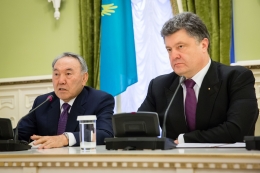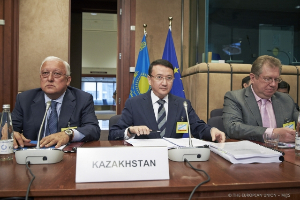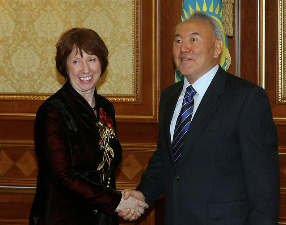Astana Strives to Resolve Ukraine Conflict
By Richard Weitz (01/22/2015 issue of the CACI Analyst)
Kazakhstan stands out in Central Asia and the South Caucasus for its government’s activist diplomacy directed at building institutions, promoting disarmament, and reducing Eurasian conflicts. Astana has sought to ban nuclear tests globally and extend confidence-building mechanisms throughout Asia, and Kazakhstan’s past conflict resolution efforts have addressed Iran, water disputes, and Afghanistan. Kazakhstan’s current mediation effort concerns the Ukraine conflict. Kazakhstan’s recurring challenge, which may disrupt its Ukrainian efforts, is that its ability to resolve disputes is limited in the absence of supporting partners.

The Mythology of Chinese Migration in Kazakhstan
By Yelena Sadovskaya (01/07/2015 issue of the CACI Analyst)
Despite a short history of current migration from the PRC to Kazakhstan – 25 years only – it is accompanied by growing tension in the receiving society. Deeply ingrained phobias and prejudices in relation to Chinese migrants, as well as “mythologization” of Chinese migration are specific phenomena rooted in the dramatic history of Kazakh tribes’ struggle against Dzungarian tribes and the Qing government. One can trace the phobias regarding Chinese migration to history (collective memory of the Kazakh people) and contemporary issues such as lack of knowledge.
Political scientists in Kazakhstan have conducted studies of myths about China and the Chinese presence in Kazakhstan. A typology of myths and phobias was offered by Konstantin Syroezhkin and includes a threat of “Chinese expansion” and control over Kazakhstan’s mineral resources; a threat of economic dominance and of Kazakhstan turning into a raw-materials supplier for China; a fear of Kazakhstan being divided and its parts annexed by China; migration of the Han Chinese to Xinjiang and further west, settling in Kazakhstan and occupying agricultural lands; and a threat of environmental disaster due to irrigation activities on the Chinese part of the Irtysh river. Each of these myths has been reproduced for years in mass media, internet and virtual commentaries.
A lack of knowledge about China was identified as one of the causes for fear in representative monitoring sociological studies conducted under the author’s supervision in 2007 and 2012, covering the urban population. The respondents demonstrated weak knowledge of Chinese culture (literature, art, traditions), as well as insufficient knowledge of its current affairs. Though the knowledge of China’s current economic, social, and political life increased from 39 percent to 49 percent between 2007 and 2012, their familiarity with Chinese culture and history remained at the same low level: 9 percent in 2012 and 10.2 percent in 2007.
It is then no wonder that this vacuum is being filled with subjective images, not based on fact and often brought in from outside. Of particular concern are the lack of reliable information and difficult access to migration statistics on China and analytical data on its economic presence in Kazakhstan, as well as the social practice of Chinese migrants’ “parallel existence” in receiving communities accompanied by an absence of communication with local people.
The fears regarding “Chinese expansion” are not new: in the 1990s, arguments against the migration of workers from China were based on concerns that it would contribute to Chinese colonization of Kazakhstan and the formation of “Chinatowns.” According to the 2007 sociological survey, 24 percent of the respondents believed that Chinese migration would negatively impact Kazakhstan’s labor market because it would raise competition. In 2012, this share increased to 31 percent.
It is in fact a myth because the number of Chinese workers amounts to a tenth, or even a hundredth of a percent of the workforce throughout the country. It does not have any serious impact on the labor market either by sectors or by regions. Moreover, Chinese workers are employed only in a few limited sectors of the labor market, or recruited to joint Chinese-Kazakhstani projects.
According to the 2012 survey, 11 percent of the respondents believed that Chinese migrants arrived to obtain Kazakhstani citizenship and 11 percent that they intended to marry Kazakh women. Contrary to popular fears, Chinese migrants do not naturalize in Kazakhstan en masse – only 80 Han Chinese have obtained Kazakh citizenship and 393 have stayed on as permanent residents in Kazakhstan in the period between 1995 and 2014, according to the Kazakh Ministry of Interior Affairs, data as of November 5, 2014.
Indeed, citizenship and permanent residence immigration to Kazakhstan is represented mostly by ethnic Kazakhs repatriates. The majority of Han Chinese arrive for temporary work or trade and do not stay for permanent residence. Kazakhstan in fact is not the most attractive country for Chinese citizens, the majority of whom prefer to move to the economically better developed eastern regions of China, South-East Asia or developed Western countries.
The 2012 survey revealed a “crystallization” of attitudes towards Chinese migrants among Kazakhstan’s urban population: “positive” and “very positive” attitudes to Chinese migrants decreased to 23 percent (from 26 percent in 2007) while the share of “negative” and “very negative” attitudes increased to 33 percent (from 18 percent in 2007). As a result, the share of those indifferent to Chinese migrants decreased by 11 percent and amounted to 44 percent in 2012. These findings can be further tested against a few hypotheses about the socio-psychological and socio-cultural processes: is it that prejudices towards the Chinese grow, or that national stereotypes become stronger?
It is also valid to question to what extent there is an increase of “xenophobia” towards migrants from China and other non-CIS countries. This has been confirmed by the results of other social surveys, such as by the Kazakhstani institute for socio-economic information and prognosis in 2010: Kazakhstani people are more tolerant to labor migrants from Russia and Central Asia than to those from China or Turkey, though migrant-phobia is present there too. Specifically, 62.9 percent of respondents have a positive or neutral attitude toward Russian migrants, out of which 27.5 percent is positive; only 19.8 percent have a negative attitude. Toward migrants from Central Asia the corresponding figures are 52.4 percent, 15.4 percent, and 31.9 percent, respectively. Toward migrants from China and other foreign countries 41.6 percent are positive or neutral, of which 15 percent are positive, and 40 percent are negative, representing the highest level of negative attitudes of all groups.
Kazakhstan has already witnessed local conflicts between locals and Chinese workers. This calls for further in-depth and applied studies to better understand what causes this low tolerance towards Chinese migrants and the widespread phobias and myths. This and other proactive measures is an important step to prevent ethnic and social tensions and migration-related conflicts, both at local and national levels.
Kazakhstan's Deepening Ties with Europe
By Nicklas Norling (11/11/2014 issue of the CACI Analyst)
On October 9, Kazakhstan and the EU concluded negotiations on an enhanced Partnership and Cooperation Agreement, superseding the PCA that had been in force since 1999. The agreement, the first of its kind, is primarily a result of strengthening trade and investment ties between Kazakhstan and EU countries developed over the past 15 years. Kazakhstan is among the most economically EU-oriented post-Soviet states and one of only three whose trade with the EU is growing relative to that with other countries. The enhanced partnership will serve as a foundation to further strengthen these ties but the EU must upgrade Kazakhstan in its list of priority countries to exploit the partnership’s full potentials.

Reaffirming Balance: Kazakhstan's Expanded Foreign Policy Strategy and its Response
By S. Frederick Starr (10/29/2014 issue of the CACI Analyst)
Kazakhstan may have not had a choice as to whether or not to join the Customs Union, given geographical realities and President Nazarbayev’s long advocacy of that course. Now that it is joining, however, Kazakhstan has advanced a new strategy that seeks to rescue and preserve its “balanced” or “multi-vectored” foreign policy and to extend it beyond geopolitics into economics and security. This requires the full engagement of the EU and U.S. The EU’s October 2014, Enhanced Partnership and Cooperation Agreement with Kazakhstan advances this goal in the economic realm, but does not touch security. The U.S. has yet to take make similar advances in its economic or security relations with Kazakhstan.

G-Globalizing Public Policy Options in Kazakhstan
By Rafis Abazov (10/01/2014 issue of the CACI Analyst)
G-Global was established as a global discussion tool, as during the last two decades public policy consultations have been a mixed blessing for the government of Kazakhstan. On the one hand, Astana has managed to attract leading international experts from world donor organizations and private consultancy groups, and has with their help quite successfully restructured the country’s economy. On the other hand, some policies have been painful and unpopular among the domestic electorate and have in some cases been heavily criticized for the lack of transparency in policy design and formulation. Will the G-Global project, created as a domestic and international public policy discussion initiative, contribute to better policy choices?






